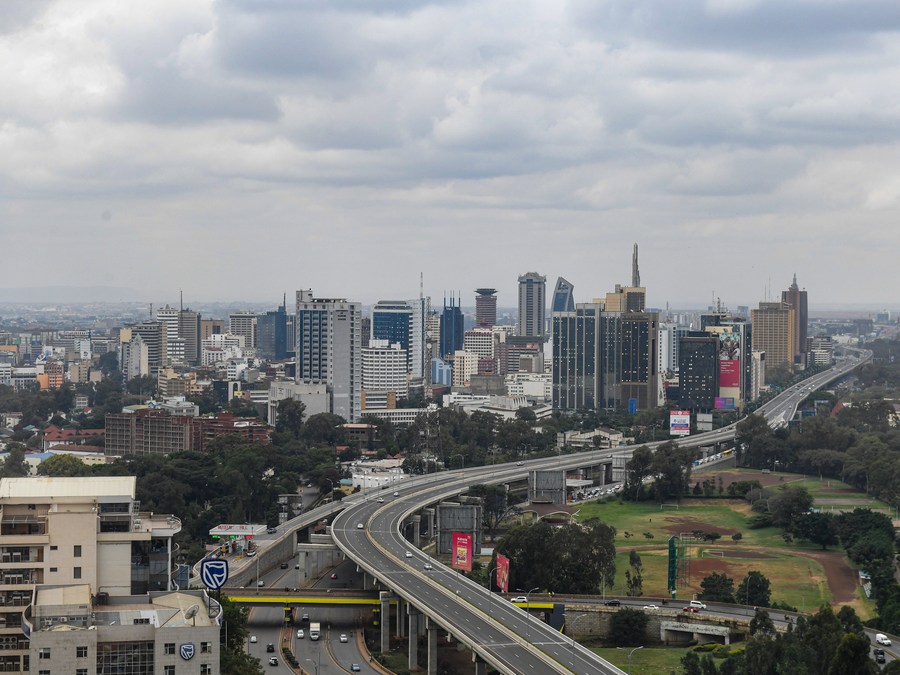
This photo taken on July 8, 2023, shows a view of Nairobi, capital of Kenya. (Xinhua/Li Yahui)
Economic growth in Africa is projected to remain modest in 2024 with geopolitical tensions, climate crisis and debt sustainability risks clouding the outlook, the United Nations (UN) World Economic Situation and Prospects (WESP) 2024 report said.
ADDIS ABABA, Jan. 26 (Xinhua) -- Economic growth in Africa is projected to remain modest in 2024 with geopolitical tensions, climate crisis and debt sustainability risks clouding the outlook, the United Nations (UN) World Economic Situation and Prospects (WESP) 2024 report said.
Launching the 2024 WESP report on Thursday in Addis Ababa, the capital of Ethiopia, Economic Affairs Officer of the United Nations Economic Commission for Africa (UNECA) Hopestone Chavula said the economic growth in Africa is projected to remain modest, increasing from an average of 3.3 percent in 2023 to 3.5 percent in 2024.
He said many African economies faced significant inflationary pressures in 2023, largely because of high fuel and food prices.
"The global economic slowdown, tighter monetary and fiscal condition, and high debt sustainability will remain a drag on the region's growth prospects," Chavula said.

This photo taken on Dec. 29, 2023, shows the Dar es Salaam port at sunrise in Dar es Salaam, Tanzania. (Xinhua/Wang Guansen)
According to the report, several African currencies, except for the institutionally pegged CFA Franc, faced depreciation pressures due to weak export earnings and limited external financing inflows.
"The unfolding climate crisis and extreme weather events will undermine agriculture output and tourism, while geopolitical instability will continue to adversely impact several sub-regions in Africa especially the Sahel and North Africa," said the report.
"High debt burden and exorbitant borrowing costs limit space for investment and growth of the continent," the report said, noting that despite these challenges, the continent's economy is forecast to grow by 4.2 percent in 2025.
Africa's growth will be driven mainly by high investment particularly in infrastructure and export of raw materials, Chavula said.
"Debt sustainability challenges pose a significant headwind to Africa's growth prospects," said the report, further stating 18 countries in Africa recorded a debt-to-GDP ratio of over 70 percent in 2023, with many of them facing debt distress.

Photo taken on March 7, 2023, shows the sunrise view in Johannesburg, South Africa. (Photo by Shiraaz Mohamed/Xinhua)
According to the UNECA Economic Affairs Officer, access to development financing remains a daunting challenge for Africa, with debt overhangs preventing many countries of the continent from accessing funds at affordable rates from international capital markets.
"Borrowing costs remain elevated, with estimates showing that borrowing costs for African countries are approximately four times higher than that of the developed countries," Chavula said.
The report further noted that weak trade performance, climate change impacts and geopolitical instability cloud outlook.
"The overall weak trade performance globally has also weighed down on Africa's growth, due to a subdued demand from key export markets and commodity prices leveling off," the report noted.

Giraffes are seen at the Masai Mara National Reserve, Kenya, Aug. 30, 2021. (Xinhua/Dong Jianghui)
According to the report, the effects of climate change continue to pose significant downward risks for Africa's economy. The continent is losing out on its economic potential due to the rising frequency and impacts of climate-induced events and natural disasters.
"Although several countries have become increasingly active in investing in the green transition, climate financing flows to Africa fall far short of its needs -- the estimated annual financing gap is about 120 billion U.S. dollars and the continent receives only 2 percent of global clean energy finance flows," the report noted.
The report said the global economic growth is projected to slow from an estimated 2.7 percent in 2023 to 2.4 percent in 2024, trending below the pre-pandemic growth rate of 3.0 percent.
"High interest rates, further escalation of conflicts, sluggish international trade, and increasing climate disasters, pose significant challenges to global growth," the report added. ■












